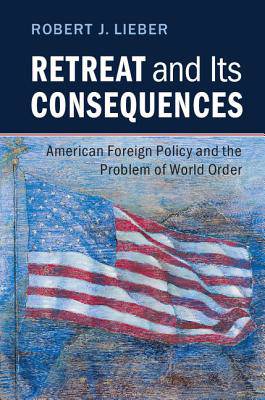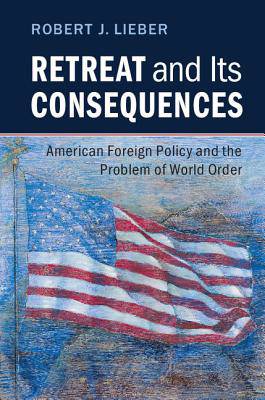
- Afhalen na 1 uur in een winkel met voorraad
- Gratis thuislevering in België vanaf € 30
- Ruim aanbod met 7 miljoen producten
- Afhalen na 1 uur in een winkel met voorraad
- Gratis thuislevering in België vanaf € 30
- Ruim aanbod met 7 miljoen producten
Zoeken
Retreat and Its Consequences
American Foreign Policy and the Problem of World Order
Robert J Lieber
Paperback | Engels
€ 37,45
+ 74 punten
Omschrijving
What are the consequences of retreat and retrenchment in foreign policy? In recent years, America has pulled back from its long-time role of international leadership. In doing so the Obama administration has sought to conciliate adversaries, shown indifference to allies; called upon the international community to step in; proclaimed and then disavowed 'red lines'; and preferred to lead from behind in the face of catastrophic civil war in Syria, ISIS barbarism in the Middle East and North Africa, Russia's predatory behavior in Eastern Europe, and China's muscle-flexing in East Asia. The consequences of this 'realist' experiment have been costly and painful, and it has caused the US to lose credibility with friends and foes. America retains the capacity to lead, but unless it resumes a more robust role, the world is likely to become a more dangerous place, with mounting threats not only to regional stability and international order, but to the national interests of America itself.
Specificaties
Betrokkenen
- Auteur(s):
- Uitgeverij:
Inhoud
- Aantal bladzijden:
- 152
- Taal:
- Engels
Eigenschappen
- Productcode (EAN):
- 9781316506714
- Verschijningsdatum:
- 3/05/2016
- Uitvoering:
- Paperback
- Formaat:
- Trade paperback (VS)
- Afmetingen:
- 153 mm x 231 mm
- Gewicht:
- 222 g

Alleen bij Standaard Boekhandel
+ 74 punten op je klantenkaart van Standaard Boekhandel
Beoordelingen
We publiceren alleen reviews die voldoen aan de voorwaarden voor reviews. Bekijk onze voorwaarden voor reviews.











